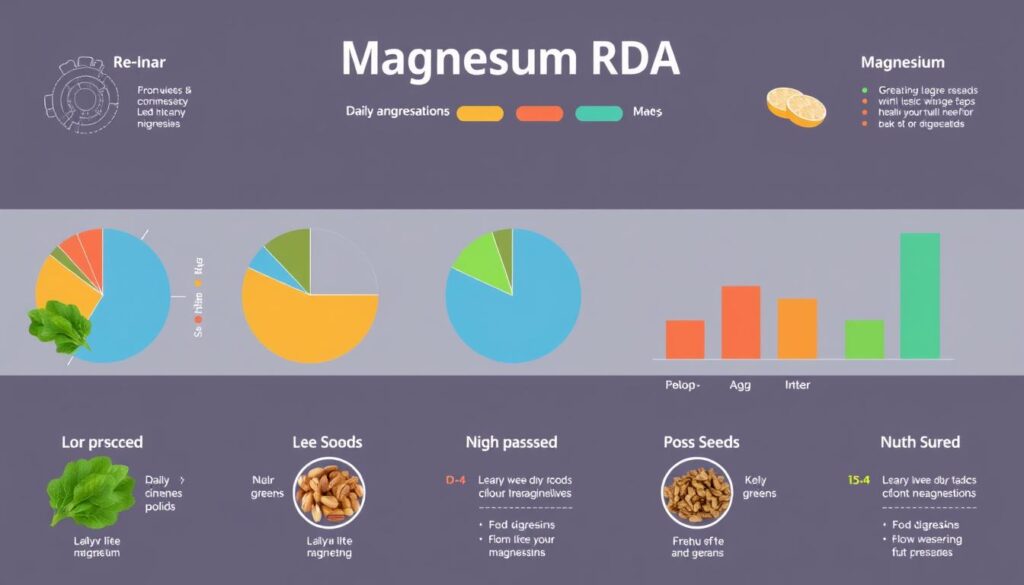Did you know that studies show a 22% drop in heart disease risk with more magnesium? Magnesium citrate is a key mineral that helps a lot. It’s good for your heart, blood sugar, stress, and sleep.
Magnesium citrate is great for your gut too. It helps with constipation and keeps your digestion smooth. More magnesium means more trips to the bathroom and better digestion.
But magnesium citrate does more than just help with digestion. It makes your heart healthier by making blood vessels more flexible. It also lowers blood pressure and helps control blood sugar.
Key Takeaways
- Magnesium citrate is a highly absorbable form of magnesium that offers various health benefits.
- It supports heart health by reducing arterial stiffness and blood pressure levels.
- Magnesium citrate promotes healthy blood sugar control, specially for people with diabetes.
- As a laxative, magnesium citrate is effective for constipation relief and bowel cleansing.
- Increased dietary magnesium intake is linked to better sleep quality and duration.
Introduction to Magnesium Citrate
Magnesium citrate is a type of magnesium supplement. It combines magnesium with citrate ions. This makes it easy for your body to absorb and use the magnesium.
Magnesium is important for many body functions. It helps with energy, muscle and nerve function, and bone health.
If you have magnesium deficiency symptoms, magnesium citrate can help. These symptoms include fatigue, muscle cramps, and irregular heartbeat. Always talk to your doctor before starting any new supplements.

Magnesium citrate has many health benefits. It supports heart health, helps control blood sugar, and reduces stress. It also improves sleep quality.
When picking a magnesium supplement, consider different types. Magnesium citrate is easy to absorb. But, other types like magnesium glycinate or magnesium malate might offer extra benefits or be easier on your stomach. Here’s a comparison of some magnesium supplements:
| Form | Benefits | Considerations |
|---|---|---|
| Magnesium Citrate | High bioavailability, supports digestion | May have a mild laxative effect |
| Magnesium Glycinate | Gentle on the digestive system, promotes relaxation | More expensive than other forms |
| Magnesium Malate | Supports energy production, less likely to cause digestive issues | May require higher doses for optimal benefits |
| Magnesium Taurate | Supports heart health and blood sugar regulation | Limited research compared to other forms |
Over two-thirds of people in the Western world do not meet their magnesium needs solely through diet.
Eating foods rich in magnesium can help. These include leafy greens, nuts, seeds, and whole grains. But, if you can’t get enough magnesium from food, supplements like magnesium citrate can help.
Magnesium Citrate: An Absorbable Form of Magnesium
Not all magnesium supplements are the same. Magnesium citrate is a top choice because it’s easy for your body to use. It’s better than other types like magnesium oxide and magnesium sulfate.

How Magnesium Citrate Differs from Other Forms of Magnesium
Magnesium citrate is very soluble. A study showed it’s 55% soluble in water. This is much better than magnesium oxide, which is almost not soluble at all.
Also, about 65% of magnesium citrate is in a form that’s easy for your body to use. This is not true for magnesium oxide. This makes magnesium citrate better for you.
Bioavailability of Magnesium Citrate
Bioavailability means how well your body uses something. Magnesium citrate is better than other magnesium types. A study showed it’s better absorbed than magnesium oxide.
| Time post-load | Magnesium Citrate (mg/mg creatinine) | Magnesium Oxide (mg/mg creatinine) |
|---|---|---|
| 4 hours | 0.22 | 0.006 |
| Second 2 hours | 0.035 | 0.008 |
This shows magnesium citrate is better absorbed. A study with 46 adults also found it’s more absorbable than magnesium oxide and magnesium chelate.
While magnesium citrate is a great choice, always talk to a doctor to find the right amount for you.
Magnesium Citrate for Heart Health
Keeping your heart healthy is very important. Magnesium citrate helps a lot with this. It helps control blood pressure and keeps arteries healthy.

Research shows magnesium citrate can make arteries more flexible. This is good because it helps blood flow better. It also makes your heart work less hard.
Magnesium’s Role in Blood Pressure Regulation and Artery Health
Magnesium is key in keeping blood pressure right. It relaxes blood vessel muscles. This stops high blood pressure and keeps blood flowing well.
It also makes artery walls strong and flexible. This lowers the chance of stiff arteries and blockages.
Studies on Magnesium Citrate and Arterial Stiffness
Studies are very positive about magnesium citrate and arteries. One study found it made arteries less stiff after 24 weeks. This is good for your heart health.
Magnesium Citrate’s Potentia to Reduce Heart Disease Risk Factors
Magnesium citrate does more than just help with blood pressure and arteries. It also helps control blood sugar and insulin. This is good for your heart.
It can also lower bad fats in the blood. This includes triglycerides and LDL cholesterol.
Magnesium citrate is commonly used to prevent arrhythmia and help improve arterial flexibility to reduce the risks associated with atherosclerosis.
Adding magnesium citrate to your daily routine is smart. Eat well and exercise too. This helps keep your heart healthy and lowers heart disease risk.
Supporting Healthy Blood Sugar Control with Magnesium Citrate
Keeping blood sugar levels healthy is key for good health. This is very important for people with type 2 diabetes or prediabetes. Magnesium helps control blood sugar, and magnesium citrate can help keep it healthy.

Magnesium’s Importance in Blood Sugar Regulation
Magnesium is very important for our bodies. It helps control blood sugar. People with insulin resistance or type 2 diabetes often have less magnesium.
This can make it harder to control blood sugar and make insulin less effective.
A 2020 review looked at 41 studies. It found that those who ate more magnesium had a 22% lower risk of getting type 2 diabetes. This shows how important magnesium is for managing blood sugar.
Magnesium Citrate Supplementation for Diabetes and Prediabetes
Magnesium citrate might help people with diabetes and prediabetes. A 2019 study with 42 people showed it could improve blood sugar control.
In 2021, a study with 50 people found that magnesium citrate lowered HbA1c levels. HbA1c is a key measure of blood sugar control over time.
| Study | Participants | Magnesium Dosage | Duration | Results |
|---|---|---|---|---|
| 2019 Study | 42 | 250 mg/day | 3 months | Reduced insulin resistance, improved blood glucose regulation |
| 2021 Study | 50 | 400 mg/day | Not specified | Significant drop in HbA1c levels |
These studies are promising, but more research is needed. Always talk to a doctor before starting any new supplements, even if you think they might help.
In short, magnesium citrate, along with a healthy diet and lifestyle, can help control blood sugar. It can also help prevent type 2 diabetes. Keeping enough magnesium in your body can make insulin work better and help manage diabetes.
Magnesium Citrate for Stress Management and Mental Health
In today’s fast world, stress and mental health issues are common. Magnesium, an essential mineral, helps manage mood and stress. Magnesium citrate, a form of magnesium, supports your mental health.
Low magnesium levels are linked to stress, anxiety, and depression. About 70% of Americans lack enough magnesium. Taking magnesium citrate can help reduce stress and promote relaxation.

Magnesium helps control neurotransmitters that affect mood and stress. While no single study proves magnesium’s effect on anxiety, some forms like magnesium taurate and glycinate are known to help.
When picking a magnesium supplement for stress and mental health, consider these tips:
- Magnesium citrate is easy to find and use.
- Magnesium glycinate may improve sleep and manage diabetes, based on a 2017 review.
- A 2022 study found magnesium l-threonate boosts mental clarity.
No exact magnesium dose for mental health is set. But, higher doses might be needed for some. Be aware of magnesium’s side effects and how it can interact with other medicines:
| Dosage | Potential Side Effects |
|---|---|
| Less than 2500mg | Loose stool or diarrhea |
| Exceeding 2500mg | Toxic hypermagnesaemia, muscle weakness, nausea, vomiting, low blood pressure, fatigue |
Always talk to a healthcare professional before starting magnesium supplements. This is true if you have kidney problems or take other medicines.
Magnesium is part of a full treatment plan for mental health, along with a good diet and stress reduction.
Adding magnesium citrate to your routine can improve your mood and reduce stress. It’s part of a balanced lifestyle for better mental health. Start using magnesium citrate today for stress management.
Improving Sleep Quality with Magnesium Citrate
Do you have trouble sleeping? Insomnia and other sleep issues are common. Magnesium citrate can help you relax and sleep better. It’s good for those who can’t fall asleep or wake up a lot at night.
How Magnesium Promotes Relaxation and Sleep
Magnesium helps control brain chemicals that make us relax and feel tired. It supports neurotransmitters like NMDA, GABA, and melatonin. This helps your body get ready for sleep.

Magnesium citrate is easy for your body to absorb. It helps with restless legs and cramps at night, which is great for pregnant women. It’s also gentle on your stomach and makes you feel calm.
Studies Linking Magnesium Intake to Better Sleep Quality
Many studies show magnesium helps you sleep better:
- Older adults who took 500 mg of magnesium for eight weeks slept longer and fell asleep faster.
- People in their 60s who took magnesium supplements slept more and woke up less during the night.
- More magnesium in the body means better sleep, longer sleep times, and less daytime tiredness.
The daily magnesium need is 310–420 mg for adults. But, many in the US don’t get enough. This can cause sleep problems.
| Age Group | Male | Female | Pregnancy | Lactation |
|---|---|---|---|---|
| 14-18 years | 410 mg | 360 mg | 400 mg | 360 mg |
| 19-30 years | 400 mg | 310 mg | 350 mg | 310 mg |
| 31-50 years | 420 mg | 320 mg | 360 mg | 320 mg |
| 51+ years | 420 mg | 320 mg | – | – |
Thinking about taking magnesium citrate for better sleep? It’s usually safe to take every night. But, watch out for side effects like diarrhea and drowsiness. Always talk to your doctor before starting any new supplement.
Magnesium is key for relaxation and healthy sleep. Adding magnesium citrate to your sleep routine can lead to better sleep and overall health.
Dietary Sources of Magnesium
Eating well is important to get enough magnesium. This helps keep you healthy. Foods like plants are full of magnesium.

Top Magnesium-Rich Foods to Include in Your Diet
Adding these magnesium-rich foods to your meals is good. They help you get enough magnesium:
- Spinach: A 1-cup serving of cooked spinach gives 37% of the Daily Value (DV) for magnesium, with 158 mg.
- Pumpkin seeds: Just 1 ounce of pumpkin seeds has 168 mg of magnesium, which is 40% of the DV.
- Dark chocolate: Enjoy a 1-ounce serving of dark chocolate for 65 mg of magnesium, or 15% of the DV.
- Chia seeds: These tiny seeds have a lot, with 1 ounce giving 23% of the DV for magnesium (96 mg).
- Almonds: A 1-ounce serving of almonds offers 77 mg of magnesium, covering 18% of the DV.
Other foods high in magnesium are legumes, tofu, whole grains, fatty fish, and bananas. Eating a variety of these foods helps keep your magnesium levels up.
“Magnesium is a vital mineral that plays a key role in many body functions. Eating foods rich in magnesium is a great way to stay healthy.”
| Food | Serving Size | Magnesium Content (mg) | % Daily Value |
|---|---|---|---|
| Leafy greens (cooked spinach) | 1 cup | 158 | 37% |
| Seeds (pumpkin seeds) | 1 ounce | 168 | 40% |
| Legumes (cooked black beans) | 1 cup | 120 | 29% |
| Whole grains (cooked buckwheat) | 1 cup | 86 | 20% |
While supplements can help, getting nutrients from food is best. If you think you might not have enough magnesium, talk to a doctor. They can help figure out what’s best for you.
How to Take Magnesium Citrate Supplements
Magnesium citrate supplements help people get more magnesium. This is good for health and wellness. It’s key to know the different types and how to use them right.

Timing and Dosage Recommendations
The right amount of magnesium varies. Most supplements have 100-200 mg per dose. Always check the label or talk to a doctor for your needs.
You can take magnesium citrate with or without food. Some like it with a meal to avoid stomach issues. Others take it at night for better sleep.
Available Forms of Magnesium Citrate Supplements
There are many ways to take magnesium citrate:
- Magnesium capsules: Easy to swallow, great for daily use.
- Magnesium powder: Mix with water for customizable doses, gentle on the stomach.
- Magnesium gummies: Tasty, good for those who can’t swallow pills.
- Magnesium liquid: Absorbs quickly, easy to mix into drinks.
Think about what you like and need when picking a supplement. Choose high-quality products from trusted brands.
“I’ve found that taking magnesium citrate powder in the evening helps me unwind and get a better night’s sleep. It’s become an essential part of my wellness routine.” – Sarah, 42
While magnesium citrate is helpful for many, talk to a doctor before starting. This is true if you have health issues or take other medicines.
Recommended Daily Intake of Magnesium
Magnesium is key for our body’s functions. It helps with energy, muscle, nerve, and bone health. You need to eat enough magnesium or take supplements. The amount you need changes with age and gender.
Magnesium Requirements for Different Age Groups
The amount of magnesium you need changes with age and sex. Here’s what you need each day:
| Age Group | Male | Female | Pregnancy | Lactation |
|---|---|---|---|---|
| Birth to 6 months | 30 mg* | 30 mg* | – | – |
| 7-12 months | 75 mg* | 75 mg* | – | – |
| 1-3 years | 80 mg | 80 mg | – | – |
| 4-8 years | 130 mg | 130 mg | – | – |
| 9-13 years | 240 mg | 240 mg | – | – |
| 14-18 years | 410 mg | 360 mg | 400 mg | 360 mg |
| 19-30 years | 400 mg | 310 mg | 350 mg | 310 mg |
| 31-50 years | 420 mg | 320 mg | 360 mg | 320 mg |
| 51+ years | 420 mg | 320 mg | – | – |
*Adequate Intake (AI)
Most of our magnesium is in our bones. Not getting enough can cause tiredness, weakness, and muscle cramps. It can also affect your heart rate.

Tolerable Upper Intake Level (UL) for Supplemental Magnesium
Magnesium from food is safe, but supplements need care. Adults should not take more than 350 mg a day. Too much can cause nausea, vomiting, and muscle weakness.
Evidence does not fully support magnesium supplements as a treatment for muscle cramps.
If you think you need more magnesium, talk to a doctor. They can help you avoid too much. Alcohol, age, and some health issues can make you more likely to need more magnesium.
Safety and Side Effects of Magnesium Citrate
Magnesium citrate is safe for most people when taken as directed. It helps with constipation and cleans the intestines before surgery. But, it’s good to know about possible side effects and interactions.
This product makes the small intestine hold more fluid. This usually leads to a bowel movement in 30 minutes to 6 hours. Too much magnesium can cause:
- Mild stomach discomfort or cramps
- Gas
- Nausea
- Diarrhea
- Loose or watery stool
Potential Side Effects and Interactions
Sometimes, serious side effects can happen. These need to be told to a doctor right away. Signs include:
- Severe stomach or abdominal pain
- Slow or irregular heartbeat
- Mental or mood changes
- Muscle weakness
- Bloody stools
- Rectal bleeding
Dehydration can happen from too much diarrhea. Signs include:
- Less urine
- Dry mouth
- More thirst
- Lack of tears
- Dizziness
- Lightheadedness
- Pale or wrinkled skin
Magnesium citrate can also interact with some medicines. This includes digoxin, sodium polystyrene sulfonate, and certain antibiotics. Always talk to a doctor before starting or stopping any medicine.
Precautions for Specific Populations
Some people should be careful with magnesium citrate. This includes those with rectal bleeding, bowel problems, heart disease, kidney disease, and stomach issues. People with colon or stomach obstructions, major kidney disorders, high magnesium or potassium levels, or low calcium levels should not use it.
Pregnant or nursing mothers should talk to a doctor before using magnesium citrate. It’s also important for those on low sodium diets to avoid it. It can affect electrolyte balance.
Magnesium citrate is good for short-term constipation relief. But, it’s not for long-term use. It can make it hard to go to the bathroom without laxatives. Always follow the instructions and talk to a healthcare professional before using it.
Conclusion
Magnesium citrate is a great form of magnesium. It helps with heart health, blood sugar, sleep, and mood. Eating foods rich in magnesium, like greens and nuts, is good. But sometimes, we need more, and supplements can help.
Choosing the right magnesium supplement is key. Magnesium citrate is better absorbed than other types. A study showed it can make blood vessels healthier. It also shows why we need enough magnesium for good health.
Always talk to a doctor before taking magnesium supplements. They can help you find the right amount. Eating well, exercising, managing stress, and getting enough magnesium are all important. They help your body work its best and keep you healthy for a long time.


